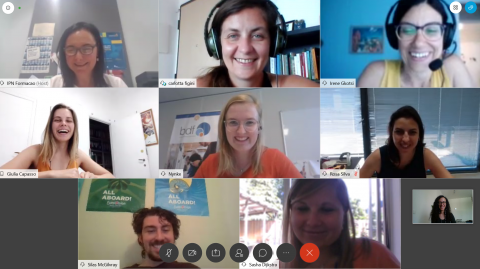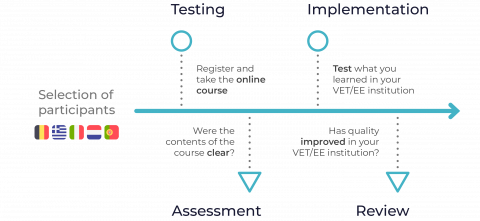5.1 - Include feedback into daily practices and procedures
Abstract
One of the fundamental skills as a QM is to be able to give and receive feedback, as well as to create
the proper environment and tools to promote it in your team. Including feedback into daily practices
and procedures will make it possible to achieve better results. Therefore, it is essential that, in
addition to the communication skills, you as a QM organize information in order to be able to
communicate it with all agents in real time. In this way it is possible to act, correct, improve. The
agents involved in this process are learners, external collaborators, teachers, mentors, companies,
etc.
Why is this important for you as a QM?
- To Review progress – it raises questions, assumptions and strategies;
- To Make adjustments – it will create the right opportunity to reflect and to improve the process;
- To Identify problems – it’s an opportunity to identify problem and possible solutions;
- To Act on the information – it allows decisions on what needs to be done or not.
And, the goals to promote and include feedback into daily practices are:
- Create commitment/concern of everyone involved;
- Promote the sense of responsibility;
- To guide/mentor;
- To support/enhance;
- Act immediately in cases where deviations from the plan may occur.
How should I implement the action?
The way feedback is delivered and how issues are discussed will certainly depend on the context and
the level of trust between you as a QM and your team.
- The action of giving or asking for feedback can be made in several different ways:
- Through the analysis of the results of the evaluation methodology (e.g. questionnaires);
- Through the organization of meetings, focus groups or other ways of joining the "training team" (trainers, tutors, QM, etc.) - in order to analyse and reflect on the data collected related to the evolution of the training process;
- Collect feedback about the working environment, the learning experience and the overall quality of the course delivery.
How should I know if I have successfully implemented this action or to what extent?
- The evaluation methodology used allows you to collect and deal with the training weaknesses in a timely manner, (e.g. improving the contents of an entrepreneurship course, replacing a trainer, diversifying the practical activities used in the training).
- What are the results of the meetings with the team of trainers, tutors, etc? What changes/improvements have been implemented? What is the impact of these changes/improvements?
These are some examples of how you can gauge whether feedback has been applied or not and what
its impact is.
Links & further readings (includes also third-party resources- videos, etc.):
- Cedefop (2015), Handbook for VET providers: https://www.cedefop.europa.eu/en/publications-and-resources/publications/3068



